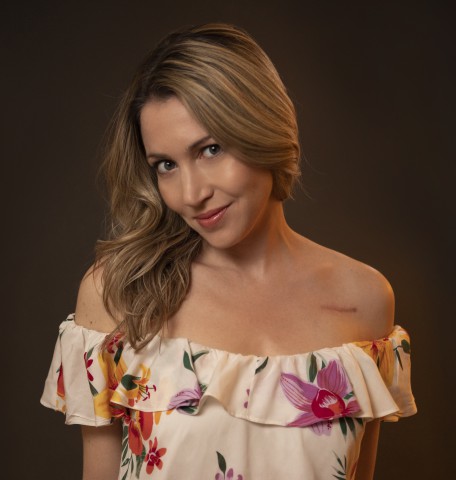
When 30-year-old Katrysha Gellis headed off to work at a graphic design agency on October 16, 2015, she never expected it to be a day that would change her life forever.
It was a typical day. She focused on her work as usual and did not suspect anything out of the ordinary. But that’s the thing about sudden cardiac arrest—it can happen when someone least expects it, with no warning at all. As Katrysha was eating lunch at her desk, she suddenly began to feel a little strange. As she mumbled to her coworkers that she didn’t feel good, she collapsed onto the ground.
In these tense moments, the Chain of Survival was activated. Her two colleagues sprang into action: As one dialed 911, the other immediately began CPR. They anxiously waited for the ambulance, every second seeming longer than the last. As luck would have it, there happened to be a team of firefighters finishing a call just around the corner. They were by Katrysha’s side in just a few minutes with an AED (Automated External Defibrillator). They shocked her twice and were able to restart her heart, but she still did not regain consciousness right away. She was brought to the hospital and remained unconscious for two days as her body healed.
She describes this point in her experience as blurry and confusing, with some short-term memory loss, possibly due to sedation. Doctors tried to figure out the cause of the cardiac arrest, but they never decided on an official diagnosis. All they could agree on was that an arrhythmia had caused her heart to stop beating. As a precaution, Katrysha received an ICD (Implantable Cardioverter Defibrillator) to monitor her heart and shock it back into its normal rhythm if needed. She also obtained medicine to help control the arrhythmia.
In time, she transitioned back to her “normal” life. Eventually she became certified as a CPR instructor and started teaching CPR in her community. She also started a new job at a first aid training and defibrillator company and began educating people about the importance of CPR and 24/7 access to AEDs —hoping that the danger was far behind her.
It wasn’t until January 2022 that Katrysha discovered the ICD was not just a precaution. As she was finishing up her workday from home, she felt herself lose consciousness and knew she was having an arrhythmia. She desperately called out to her husband and then collapsed. He called 911; meanwhile the ICD shocked her heart and restored a normal heart rhythm.
Katrysha describes how this scary moment impacted her life, saying, “I was completely caught off guard because I really didn’t expect it to happen again... it’s a really bizarre feeling.” The difference between the first time and the second time was that while the first time Katrysha had little to no memory of the event, the second time she remembered everything. All the vivid details, such as lying on the ground half-conscious while her husband called 911, made this event much more traumatic than the first.
“It took me quite a few months to actually heal from that experience,” Katrysha shared during an interview with the Sudden Cardiac Arrest Foundation. “There were a couple months when I felt completely not like myself. I didn’t want to see anyone, didn’t want to do anything, didn’t want to talk to anyone.” Fortunately, she was able to take a few months off from work and began seeing a therapist.
Therapy was extremely helpful as she adapted to the major disruption in her life and became stronger mentally. Being able to talk through things helped her know that her life could still have meaning, and that her cardiac arrest doesn’t define her. It was also validating to her to hear that it is okay to feel the way she did, and that she could recognize that what she went through was extremely traumatic and scary.
Katrysha has been able to experience many milestone events since her cardiac arrest, but the the highlight was when she got married. In describing how special this day was, she said “Of course you can’t help but think, wow, if things had been different, I wouldn’t be here.”
When asked if there was anything she would want other survivors of cardiac arrest to know, Katrysha said, “When you experience a trauma, you need to be kind to yourself and give yourself permission to heal in whatever way that means to you.” She said healing is not a linear process, and it’s important to know and recognize that every day will be different. “It’s essential to give both your body and your mind time to heal. Everyone is on their own journey of life,” she said.
By Sawyer May Reed
